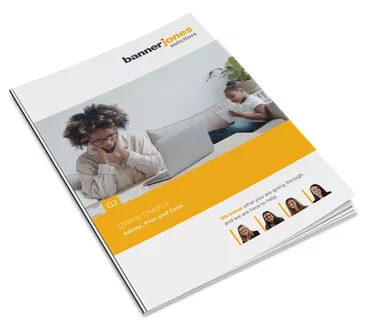What is online divorce?
Launched in May 2018, the online divorce platform allows members of the public to be able to petition for a divorce themselves online on the government website. You will be guided through a series of questions and will be asked to upload several documents. The forms are available for free, along with guides at www.gov.uk/divorce.
When is online divorce appropriate?
The online divorce process is worth considering if you have no difficulty completing forms online, and understand the process
and questions asked of you on the website. The website sets out a step by step guide. We often advise clients to access the website first to see if they would feel comfortable doing this themselves or whether they would like us to take the stress away and represent them in the divorce process.
We would advise that obtaining legal advice about your financial situation is essential. A financial remedy order is needed to ensure you have a clean break. You need advice as what you are entitled to and what would be a fair financial settlement. If you have children and cannot agree arrangements you may also need legal advice on that issue.
NOTE: The online divorce process does not include finalising the financial and child arrangements.
Before you apply
You must decide whether you want to make a joint application with your husband or wife or whether you want to apply on your own. It normally takes at least 7 months to get a divorce. This is the same for joint and sole applications.
What you will need
When applying for divorce online, you will need both yourself and your former spouse’s full names and addresses so the court can send them a copy of the divorce application. You can access help at www.gov.uk/divorce-missing-husband-wife if do not know your husband or wife’s address. You will also need your original marriage certificate or a certified copy of it, and proof of any name changes if you’ve changed your name since separating from your partner.
Costs and funding online divorce
You will save on solicitor’s fees, but will need to pay the Court fee, which is currently £593. This is paid for online when the application is made.
You may be able to get help with fees if you are entitled to benefits, or are on a low income. If you apply for funding help, a decision will be made based on your financial status, and you may be asked to pay some or all of the fee.
What does an online divorce not include?
Childcare arrangements
You know your children better than anyone else and as a parent you are best placed to make the important decisions for them, but there may be times you need more advice and support regarding children and divorce. You can choose how to make arrangements for looking after your children if you separate from your partner.
We advise parents to mutually agree on future arrangements for their children so that a non-confrontational solution can be met. However, when parents/carers cannot agree who the child can see, spend time with and have contact then the Court make the decision via a Child Arrangements Order. The Court will always make their decision based on the best interests of the child or children involved. Once an agreement is made, it can easily be changed as circumstances change and the child or children get older. However, a Child Arrangements Order is binding and you will need to apply to Court to change it.
Financial agreements
It is important to note that finances are not finalised without having a Financial Remedy Order. Even if you and your ex-spouse have an informal agreement, there is no clean break unless you have a court-agreed Order meaning that financial claims remain open and can be pursued at a later date. It is useful to begin negotiations alongside the divorce proceedings. You can usually avoid going to court hearings if you come to an amicable agreement on how to split your money and property. You should be aware that a financial remedy order/consent order cannot be filed at Court until the Conditional Divorce Order has been made. Once an order is approved by the Court, it is very difficult to change. It will be binding unless there are exceptional circumstances. You cannot simply change your mind. You should consider delaying applying for the final order if you do not have a sealed consent order/financial remedy in place for the following reasons:
- Your entitlement to certain assets of the marriage may be affected, particularly but not limited to pension funds or trust funds.
- If your spouse died before the financial arrangements are finalised, you may lose pension rights or life policies once the Final Divorce Order is made.
- If your spouse were to die, you will no longer have any Widows rights against his estate.
- If any assets are later transferred which attract tax charges, if that tax has an exemption for transfers between spouses that exemption will be lost, such as stamp duty (at present).
- There may be tactical reasons not to make the application immediately.
What value can solicitors add to a divorce?
Solicitors can advise and assist on the divorce process and prepare the application for you and progress the matter on the divorce portal which has been set up for Solicitors. Any additional matters outside of the divorce itself, such as negotiating agreements to do with children and finances on your behalf, can be done by the Solicitor.
Having a solicitor providing legal advice ensures that you are supported throughout the process which can help to reduce the emotional burden. A solicitor can also ensure that the forms are completed correctly so that there are no delays and increased costs incurred by errors made on the forms.

- Director
- Solicitor
- Head of Family Law


